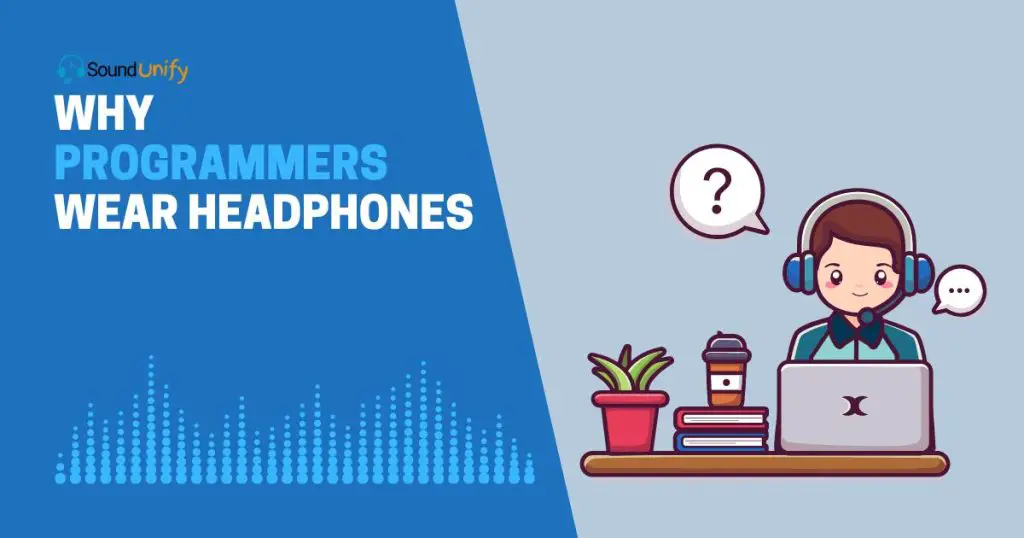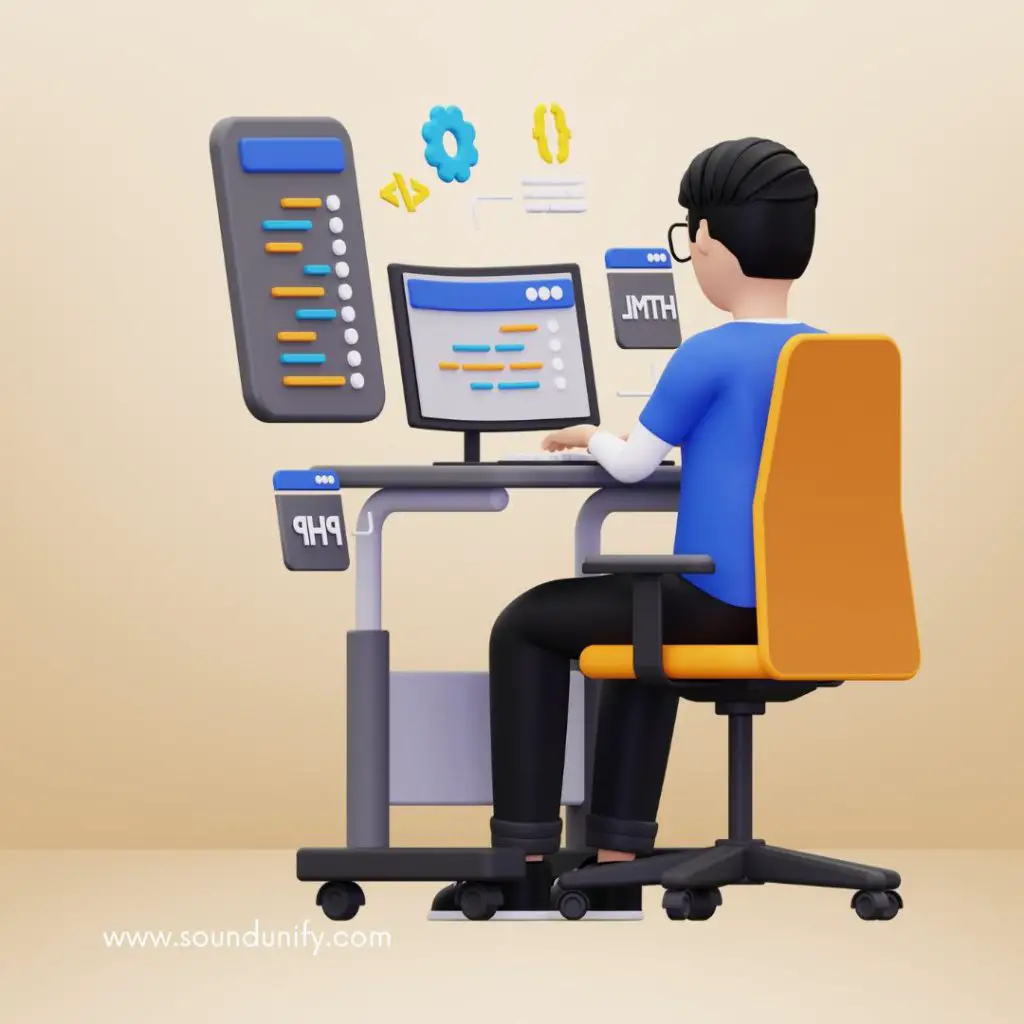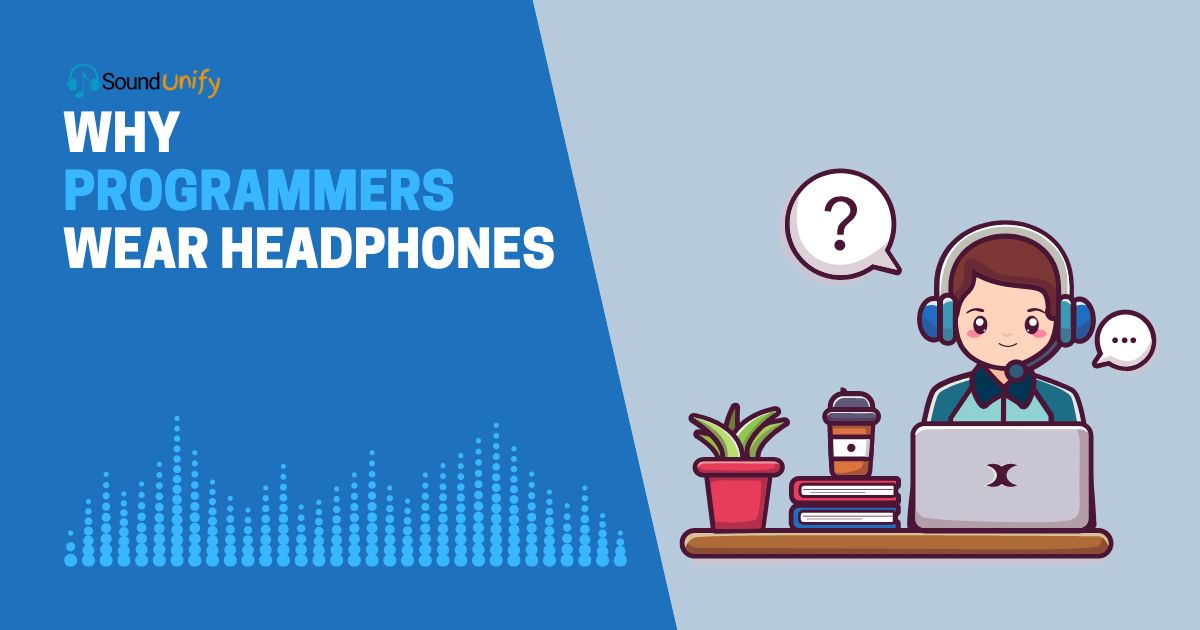Programmers wear headphones to create a personal focus bubble and block out distractions. It's their secret weapon for productivity.
As someone who’s always been intrigued by coding, I’ve often wondered about this common sight in tech offices and coffee shops.
You see, programming is a task that demands intense concentration and precision. A single interruption can break a programmer’s flow, setting them back by minutes, if not hours. That’s where headphones come in. They serve as a do-not-disturb sign, signaling others to tread lightly.
But it’s not just about warding off interruptions. Headphones, especially those playing the right music, can help programmers get into the zone faster. It’s a fascinating blend of psychology, work culture, and personal preference.
So, if you’ve ever been curious about why programmers wear headphones, stick around. We’re about to dive deep into this topic.
Why Do Programmers Wear Headphones While Programming?

Programmers wear headphones for several reasons, which can significantly enhance their productivity and focus. Here are ten common reasons why programmers often choose to wear headphones:
1. Enhanced Noise Cancellation
Noise cancellation is a significant reason why programmers wear headphones. In a busy office environment, there can be numerous distractions, from the chatter of colleagues to the hum of machinery.
These noises can be particularly disruptive when a programmer tries solving complex problems or debugging code.
Headphones, especially those with noise-canceling features, help to block out this ambient noise, creating a quieter environment for the programmer. This can be particularly beneficial for tasks requiring high concentration, such as programming.
A study titled “Generative Rules for Music Performance: A Formal Description of a Rule System” by A. Friberg discusses the impact of noise and music on performance.
Although the study is not specific to programming, it provides valuable insights into how noise and music can affect performance in tasks that require concentration and precision, such as programming.
2. Focus and Concentration
Programming requires a high level of focus and concentration. Even minor distractions can lead to errors in code, which can be time-consuming to correct.
Wearing headphones can help programmers to create a personal space, enabling them to focus on their work without external interruptions.
A study titled “Music Lessons Improve Auditory Perceptual and Cognitive Performance in Deaf Children” by F. Rochette, A. Moussard, and E. Bigand discusses the impact of music on cognitive performance.
The study found that music lessons improved auditory scene analysis, auditory working memory, and phonetic discrimination tasks. These findings suggest that listening to music could enhance focus and concentration, which are crucial for programming tasks.
3. Code Rhythm
Headphones play a significant role in the daily routine of many programmers. They are more than just a tool for listening to music or blocking out noise; they are essential accessories that can enhance productivity and the quality of their work.
Here are some key points about the importance of headphones in programming:
- Enhanced Focus: Headphones help programmers create a personal space to focus on their work without external interruptions. This can be particularly beneficial when working on complex tasks that require deep concentration.
- Learning Opportunities: Programmers often listen to tutorials or podcasts to stay up-to-date with the latest technologies and best practices. Headphones allow them to listen to these resources without disturbing others.
- Mood Regulation: Music has a profound effect on our moods and emotions. Programmers often use music to manage their stress levels and maintain a positive attitude, enhancing productivity.
4. Creating a Personal Space with Headphones
Headphones are a powerful tool for programmers, enabling them to carve out a personal space even in bustling work environments. When a programmer dons their headphones, it’s akin to creating a protective bubble around themselves.
Here are some key points about how headphones aid in making this personal space:
- Barrier from External Environment: This bubble acts as a barrier, separating the programmer from the external environment. It signals the world they are in their zone, fully immersed in their code.
- Tuning Out the Outside World: With their headphones on, programmers can tune out the outside world. All the ambient noise fades into the background, and they can focus solely on their code. It’s almost as if they’re in their world, where their code is the only thing that matters.
- Beneficial for Complex Problems: This personal space can be conducive when a programmer works on complex problems requiring a high concentration level. The isolation provided by the headphones allows them to dive deep into the problem without any distractions.
- Control Over Audio Environment: Headphones give programmers control over their audio environment. They can choose to listen to their favorite music, white noise, or even the sound of rain, creating an environment that best suits their mood and the task at hand.
5. To Communicate with Others
In today’s digital world, many programmers work remotely and rely on online communication tools.
Headphones with built-in microphones make participating in these virtual meetings or discussions easy. They provide clear audio, which is essential for effective communication.
Moreover, using headphones for communication shows respect for others in the workspace. It ensures that your conversations don’t disturb others who might be focusing on their work.
In this way, headphones aid in receiving communication and ensuring that the communication is not disruptive to others.
6. Immersion
Sometimes, programmers must immerse themselves in their work, especially when working on complex problems. Music or ambient sounds played through headphones can help create this immersive environment.
When deeply immersed in their work, programmers can achieve a state of ‘flow.’ This is intense focus and high productivity, where the programmer is so engrossed in their work that they lose track of time.
Headphones can facilitate this flow state by creating an immersive environment conducive to deep focus.
7. Mood Regulation
Music has a profound effect on our moods and emotions. It can uplift us when we’re feeling down, energize us when we’re tired, and calm us when we’re stressed. For programmers, this mood regulation can be particularly beneficial.
Programming can be demanding, with tight deadlines and complex problems to solve. Listening to their favorite music can help programmers manage their stress levels and maintain a positive mood.
A positive attitude can enhance productivity and creativity, leading to better performance.
8. Blocking Distractions
In today’s open office environments, distractions are everywhere. From colleagues walking by to impromptu meetings happening nearby, these distractions can break a programmer’s concentration, leading to mistakes and decreased productivity.
Headphones can help programmers block out these distractions. By wearing headphones, programmers can create a barrier between themselves and the external environment, allowing them to focus on their work.
This can be particularly beneficial when working on complex tasks that require deep concentration.
9. Personal Comfort with Headphones
Comfort plays a pivotal role in a programmer’s productivity. If a programmer is uncomfortable, their productivity will likely take a hit. Headphones, especially those with soft padding, can provide comfort that enhances a programmer’s work experience.
Here are some key points about how headphones contribute to personal comfort:
| Aspect of Comfort | Contribution of Headphones |
|---|---|
| Physical Comfort | Soft padding on headphones can be more comfortable than the hard surface of the outer ear touching the headrest of a chair, especially after long hours of work. |
| Control Over the Audio Environment | Headphones give programmers control over their audio environment, allowing them to create an environment that suits their mood and the task. |
10. Professionalism
In a shared workspace, it’s essential to respect the working environment of others. Listening to music, tutorials, or podcasts without headphones can be disruptive to others.
Using headphones demonstrates professionalism, respecting others’ space and their need for a quiet work environment. It’s a simple way for programmers to ensure they’re not disturbing their colleagues with their audio.
11. Listening to Tutorials or Podcasts
Programming is a field that’s constantly evolving, with new languages, tools, and best practices emerging regularly. To stay up-to-date, programmers often listen to tutorials or podcasts while they work.
These resources can provide valuable insights and knowledge, helping programmers improve their skills and remain at the forefront of their field.
Headphones are handy here, allowing programmers to listen to these resources without disturbing others. They can learn new things right at their desk while working on their tasks.
12. Looking Cool
Let’s not forget the cool factor! Headphones, especially high-quality ones, can be a fashion statement. They come in various styles, colours, and shapes, allowing programmers to express their style.
Wearing headphones can give programmers a relaxed, focused look, adding to their professional persona.
Are There Any Disadvantages to Wearing Headphones While Programming?

While wearing headphones can benefit programmers, there are also potential disadvantages that should be considered. These include:
- Hearing Damage: Prolonged exposure to loud music can lead to hearing problems. Even with headphones, the risk remains if the volume is too high. Taking regular breaks and keeping the volume safe is recommended to prevent potential hearing damage.
- Physical Discomfort: Wearing headphones for extended periods can cause physical discomforts, such as ear pain or headaches. This can be particularly problematic for programmers who spend long hours coding.
- Social Isolation: Headphones can create a barrier between programmer and their colleagues. This can lead to isolation and hinder collaboration or team bonding.
- Distraction: While music can help some people focus, it can be a distraction for others. Lyrics or complex musical compositions might divert attention away from the task.
- Dependence: There’s a risk of overly relying on headphones to focus. This could be problematic in situations where headphones are not available or appropriate.
- Missed Information: With headphones on, programmers might miss essential announcements or discussions in their work environment.
It’s important to note that these disadvantages can be mitigated with proper use and awareness. For instance, taking regular breaks can help prevent hearing damage and physical discomfort.
Balancing periods of sole focus with interaction can help avoid social isolation. Choosing the right type of music can minimize distractions.
What Type of Music Do Programmers Listen to While Coding?
The type of music programmers listens to while coding can vary greatly depending on personal preference. However, certain types of music are commonly preferred due to their ability to enhance focus and productivity.
- Classical Music: Known for its complex structures and calming effect, classical music can help programmers focus on their work. Studies have shown that listening to classical music can improve spatial-temporal reasoning and benefit problem-solving tasks in programming.
- Ambient Music: Ambient music, characterized by its emphasis on tone and atmosphere over traditional musical structure, can create a soothing background noise that helps programmers concentrate on their work.
- Instrumental Music: Music without lyrics is often preferred as it minimizes distractions. The absence of lyrics allows programmers to focus on their logical thinking without getting sidetracked by the words in a song.
- Electronic Music: Some programmers find the steady beats of electronic music, such as techno or trance, helpful in establishing a rhythm for their work.
- Video Game Music: Video game music is designed to provide an engaging background that doesn’t distract from the task (playing the game). This makes it a good programming fit, requiring a high concentration level.
- Lo-fi Hip Hop: Lo-fi hip hop, known for its relaxed and chill beats, has gained popularity among programmers. The genre’s repetitive beats can help programmers get into a “flow” state, a mental state where they are fully immersed in the task.
It’s important to note that the effectiveness of music in enhancing productivity can vary from person to person. What works for one programmer might not work for another.
Therefore, each programmer must find the type of music that works best for them.
| Type of Music | Why It’s Preferred |
|---|---|
| Classical Music | Enhances focus and spatial-temporal reasoning |
| Ambient Music | Creates a soothing background noise |
| Instrumental Music | Minimizes distractions |
| Electronic Music | Provides steady beats |
| Video Game Music | Designed to not distract from the task at hand |
| Lo-fi Hip Hop | It helps achieve a “flow” state |
FAQs
Do programmers wear headphones?
Yes, many programmers wear headphones while working. Headphones can help create a personal quiet zone, block out distractions, enhance focus with music, and facilitate communication in virtual meetings or calls.
Can programmers listen to music while working?
Yes, many programmers listen to music while working. Certain types of music, such as classical, ambient, or instrumental, can enhance focus and productivity.
Do I need headphones for coding?
While not a necessity, headphones can be beneficial for coding. They can help block out distractions and create a conducive work environment. However, whether or not you need headphones for coding can depend on your preferences and work environment.
Do software engineers use headphones?
Yes, like programmers, many software engineers also use headphones while working for the same reasons – to block out distractions, listen to music, or communicate during virtual meetings.
Why do programmers use headphones instead of earpieces?
Programmers often prefer headphones over earpieces due to better sound quality, superior noise isolation/cancellation, comfort during extended periods of use, and often better built-in microphones. However, choosing headphones and earpieces ultimately depends on personal preference and specific needs.
Final Thoughts
After delving into why programmers wear headphones, I’ve gained a new appreciation for this common practice. It’s not just about enjoying music – it’s about creating a personal sanctuary for focus, blocking distractions, and enhancing communication.
Whether in an office or working remotely, headphones adapt to the programmer’s needs, providing comfort and a sense of personal space.
It’s truly remarkable how this simple accessory can significantly boost productivity and make coding a more enjoyable experience.
James Dimento is a Chief-in-Editor of SoundUnify. He is a headphone enthusiast and creative writer passionate about audio technology. He has three years of experience writing about headphones and sound quality and is responsible for creating reviews and taking care of all administration.
